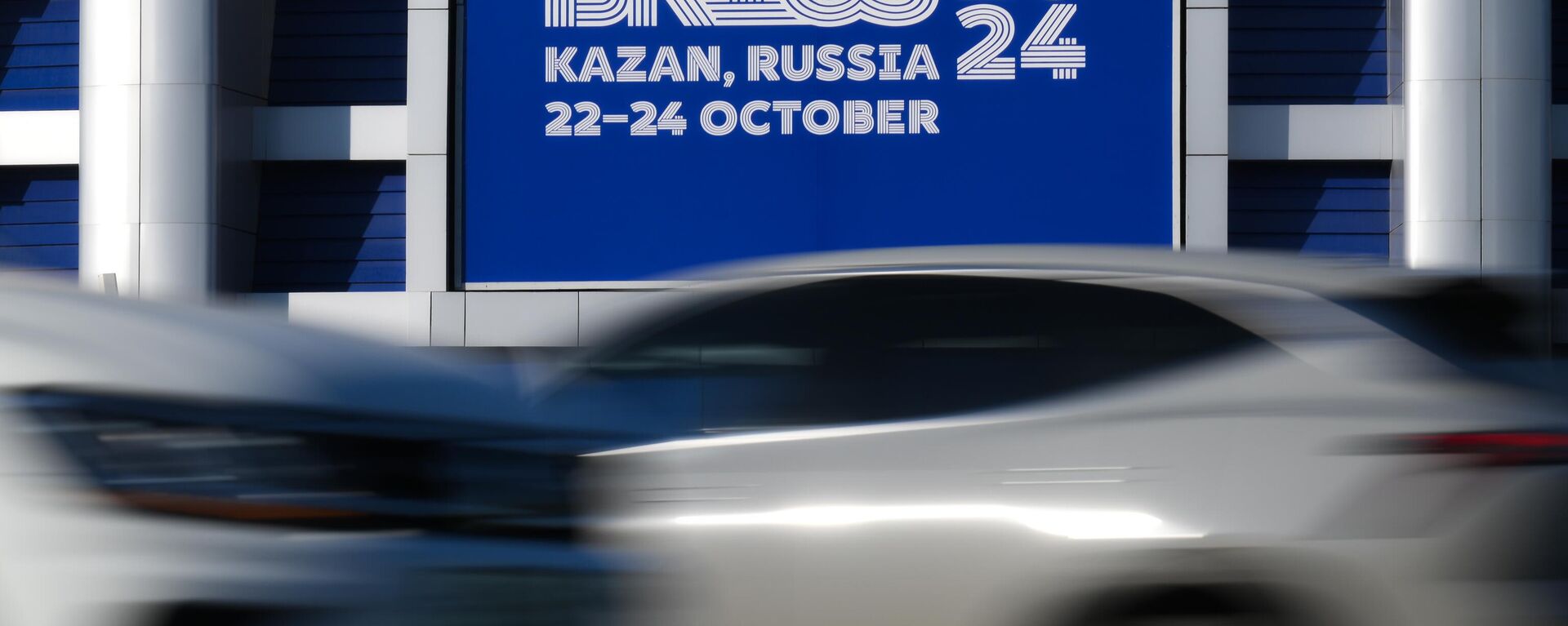https://sputnikglobe.com/20241025/how-brics-sould-add-to-uns-fully-fledged-reform-1120675341.html
How BRICS Сould Add to UN’s Fully-Fledged Reform
How BRICS Сould Add to UN’s Fully-Fledged Reform
Sputnik International
During a recent BRICS Summit in Russia, participants adopted the Kazan Declaration, in which member states reaffirmed their support for comprehensive reform of the UN, including the Security Council.
2024-10-25T12:23+0000
2024-10-25T12:23+0000
2024-10-25T13:04+0000
analysis
russia
un security council (unsc)
reform
2024 brics summit in russia's kazan
influence
organizations
pressure
https://cdn1.img.sputnikglobe.com/images/sharing/article/eng/1120675341.jpg?1729861479
The UN Security Council (UNSC) should be expanded "to reflect the vastly different world of today," Robinder Sachdev, geopolitical and economic diplomacy analyst and founder president of the Imagindia Institute, told Sputnik.If the Security Council is not reformed, "it risks losing credibility and relevance in a rapidly changing world, in the next ten to twenty years. This stagnation will continue to weaken international cooperation, destabilize global governance, and reduce the United Nations to a helpless bystander," the analyst warned.Speaking at the 2024 BRICS Summit in Russia's Kazan earlier this week, Russian President Vladimir Putin said that the share of developing countries in the global economy has grown dramatically over the past decade, but this has not been adequately reflected in UN organizations."Developing nations should have the ability to contribute to matters and policies of trade, climate action, and technology transfer. The UN must also prioritize development-focused initiatives, such as capacity-building and sustainable growth, to address their specific challenges," the analyst noted.In particular, BRICS "can leverage its collective influence, making it clear that the UN’s failure to reform could lead to the rise of alternative multilateral organizations. This signals that the UN’s relevance is at risk if emerging powers remain excluded from decision-making," Sachdev emphasized.In a recent interview with Sputnik, Eduardo Paes Saboia, the secretary of Asia and the Pacific at the Brazilian Foreign Ministry, said that with multilateralism now "in crisis," the hope is that BRICS "will help call for a reform of multilateral institutions and a stronger role for the UN in the international system."
https://sputnikglobe.com/20241022/brazil-within-brics-advocates-for-reform-of-global-governance-including-un---diplomat-1120629690.html
russia
Sputnik International
feedback@sputniknews.com
+74956456601
MIA „Rossiya Segodnya“
2024
Oleg Burunov
https://cdn1.img.sputnikglobe.com/img/07e4/09/0b/1080424846_0:0:2048:2048_100x100_80_0_0_3d7b461f8a98586fa3fe739930816aea.jpg
Oleg Burunov
https://cdn1.img.sputnikglobe.com/img/07e4/09/0b/1080424846_0:0:2048:2048_100x100_80_0_0_3d7b461f8a98586fa3fe739930816aea.jpg
News
en_EN
Sputnik International
feedback@sputniknews.com
+74956456601
MIA „Rossiya Segodnya“
Sputnik International
feedback@sputniknews.com
+74956456601
MIA „Rossiya Segodnya“
Oleg Burunov
https://cdn1.img.sputnikglobe.com/img/07e4/09/0b/1080424846_0:0:2048:2048_100x100_80_0_0_3d7b461f8a98586fa3fe739930816aea.jpg
recent brics summit in russia, un’s key decision-making bodies, global community of 8 billion people, alternative multilateral organizations, reform of multilateral institutions
recent brics summit in russia, un’s key decision-making bodies, global community of 8 billion people, alternative multilateral organizations, reform of multilateral institutions
How BRICS Сould Add to UN’s Fully-Fledged Reform
12:23 GMT 25.10.2024 (Updated: 13:04 GMT 25.10.2024) During a recent BRICS Summit in Russia, participants adopted the Kazan Declaration, in which member states specifically reaffirmed their support for comprehensive reform of the UN, including the Security Council.
The UN Security Council (UNSC) should be expanded "to reflect the vastly different world of today," Robinder Sachdev, geopolitical and economic diplomacy analyst and founder president of the Imagindia Institute, told Sputnik.
The UN’s "key decision-making bodies, like the Security Council, disproportionately reflect the interests of a few powerful nations, sidelining most member states. The voices of other countries and smaller nations are often drowned out, making the UN non-representative of the global community of 8 billion people. This imbalance undermines its legitimacy as a truly inclusive and equitable international institution," Sachdev said.
If the Security Council is not reformed, "it risks losing credibility and relevance in a rapidly changing world, in the next ten to twenty years. This stagnation will continue to weaken international cooperation, destabilize global governance, and reduce the United Nations to a helpless bystander," the analyst warned.
Speaking at
the 2024 BRICS Summit in Russia's Kazan earlier this week, Russian President Vladimir Putin said that the share of developing countries in the global economy has grown dramatically over the past decade, but this has not been adequately reflected in UN organizations.
Sachdev said in this regard that "UN institutions must reform to reflect the growing population needs and economic reality of developing countries in early 21st century, by increasing their representation in decision-making bodies, especially in the Security Council and key financial agencies."
"Developing nations should have the ability to contribute to matters and policies of trade,
climate action, and technology transfer. The UN must also prioritize development-focused initiatives, such as capacity-building and sustainable growth, to address their specific challenges," the analyst noted.

22 October 2024, 04:30 GMT
He added that BRICS, for its part, can contribute to transforming the UN "through a two-track parallel strategy," which includes "long-term pressure for reform" and "near-term actionable strategies."
In particular, BRICS "can leverage its collective influence, making it clear that the UN’s failure to reform could lead to the rise of alternative multilateral organizations. This signals that the UN’s relevance is at risk if emerging powers remain excluded from decision-making," Sachdev emphasized.
"BRICS can push for reforms on specific issues like expanding the UNSC with co-equal rights for new members, or enhancing the role of the Global South in development programs, or a solution to a civil war and humanitarian crisis in some region in the world, building momentum for broader changes," he concluded.
In a recent interview with Sputnik, Eduardo Paes Saboia, the secretary of Asia and the Pacific at the Brazilian Foreign Ministry, said that with multilateralism now "in crisis," the hope is that BRICS "will help call for a reform of multilateral institutions and a stronger role for the UN in the international system."



